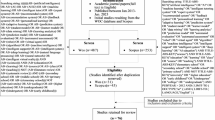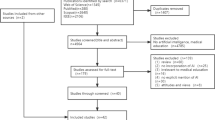Abstract
This study aims to investigate the use of artificial intelligence in health education in the last ten years from 2012 to 2022 using the Scopus database. Researchers use bibliometric analysis combined with the quantification method of Vosviewer and Rstudio software used for literature analysis. The results of the article that were flushed showed data such as the year of publication, journal, country, keywords, and authors, to the highest number of citations. The general keywords used by researchers are artificial intelligence, medical, and education. Researchers limit findings through keywords as in the last ten years and English only so that 1681 articles were obtained. According to the study's findings, McGill University affiliation had the greatest number of papers, with 69 pieces, and medicine had a proportion of 39.7% (n = 1067). This bibliometric study will be useful for other researchers to examine the development of research on artificial intelligence in health education in the last ten years.
Access this chapter
Tax calculation will be finalised at checkout
Purchases are for personal use only
Similar content being viewed by others
References
Borgohain DJ, Bhardwaj RK, Verma MK (2022) Mapping the literature on the application of artificial intelligence in libraries (AAIL): a scientometric analysis. Libr Hi Tech. https://doi.org/10.1108/LHT-07-2022-0331
Luo J (2022) A Bibliometric review on artificial intelligence for smart buildings. Sustainability 14:10230. https://doi.org/10.3390/su141610230
Liu ZL, Peng CH, Xiang WH, Tian DL, Deng XW, Zhao MF (2010) Application of artificial neural networks in global climate change and ecological research: an overview. Chin Sci Bull 55:3853–3863. https://doi.org/10.1007/s11434-010-4183-3
Johnson M, Jain R, Brennan-Tonetta P, Swartz E, Silver D, Paolini J, Mamonov S, Hill C (2021) Impact of big data and artificial intelligence on industry: developing a workforce roadmap for a data driven economy. Glob J Flex Syst Manag 22:197–217. https://doi.org/10.1007/s40171-021-00272-y
Jia K, Wang P, Li Y, Chen Z, Jiang X, Lin C-L, Chin T (2022) Research landscape of artificial intelligence and e-learning: a bibliometric research. Front Psychol 13:1–14. https://doi.org/10.3389/fpsyg.2022.795039
Lee J, Wu AS, Li D, Kulasegaram KM (2021) Artificial intelligence in undergraduate medical education: a scoping review. Acad Med 96:S62–S70. https://doi.org/10.1097/ACM.0000000000004291
Davenport T, Kalakota R (2019) The potential for artificial intelligence in healthcare. Future Healthcare J 6:94–98. https://doi.org/10.7861/futurehosp.6-2-94
Pesapane F, Codari M, Sardanelli F (2018) Artificial intelligence in medical imaging: threat or opportunity? Radiologists again at the forefront of innovation in medicine. Eur Radiol Exp 2. https://doi.org/10.1186/s41747-018-0061-6
Chang C-Y, Jen H-J, Su W-S (2022) Trends in artificial intelligence in nursing: Impacts on nursing management. J Nurs Manag 30:3644–3653. https://doi.org/10.1111/jonm.13770
Hwang G-J, Tang K-Y, Tu Y-F (2022) How artificial intelligence (AI) supports nursing education: profiling the roles, applications, and trends of AI in nursing education research (1993–2020). Interact Learn Environ 0:1–20. https://doi.org/10.1080/10494820.2022.2086579
Aria M, Cuccurullo C (2017) Bibliometrix: an R-tool for comprehensive science mapping analysis. J Inf 11:959–975. https://doi.org/10.1016/j.joi.2017.08.007
Maulana FI, Febriantono MA, Raharja DRB, Sofiani IR, Firdaus VAH (2021) A scientometric analysis of game technology on learning media research study in recent 10 years. In: 2021 7th ınternational conference on electrical, electronics and ınformation engineering (ICEEIE), pp 1–6. https://doi.org/10.1109/ICEEIE52663.2021.9616963
Purnomo A, Afia N, Prasetyo YT, Rosyidah E, Persada SF, Maulana FI (2022) Meiryani: business model on M-business: a systematic review. Procedia Comput Sci 215:955–962. https://doi.org/10.1016/j.procs.2022.12.098
Maulana FI, Audia Agustina I, Gasa FM, Rahmadika S, Ramdania DR (2021) Digital art technology publication in ındonesia: a bibliometric analysis (2011–2020) technology. In: 2021 International conference on ınformation management and technology (ICIMTech), pp 375–379. https://doi.org/10.1109/ICIMTech53080.2021.9535104
Agbo FJ, Oyelere SS, Suhonen J, Tukiainen M (2021) Scientific production and thematic breakthroughs in smart learning environments: a bibliometric analysis. Smart Learn Environ 8:1. https://doi.org/10.1186/s40561-020-00145-4
Agbo FJ, Sanusi IT, Oyelere SS, Suhonen J (2021) Application of virtual reality in computer science education: a systemic review based on bibliometric and content analysis methods. Educ Sci 11. https://doi.org/10.3390/educsci11030142
Liu S, Yang L, Zhang C, Xiang Y-T, Liu Z, Hu S, Zhang B (2020) Online mental health services in China during the COVID-19 outbreak. Lancet Psychiatry 7:e17–e18. https://doi.org/10.1016/S2215-0366(20)30077-8
Tjoa E, Guan C (2021) A Survey on explainable artificial intelligence (XAI): toward medical XAI. IEEE Trans Neural Netw Learn Syst 32:4793–4813. https://doi.org/10.1109/TNNLS.2020.3027314
Aoun JE (2017) Robot-proof: higher education in the age of artificial intelligence. The MIT Press
Esteva A, Kuprel B, Novoa RA, Ko J, Swetter SM, Blau HM, Thrun S (2017) Dermatologist-level classification of skin cancer with deep neural networks. Nature 542:115–118. https://doi.org/10.1038/nature21056
Niazi MKK, Parwani AV, Gurcan MN (2019) Digital pathology and artificial intelligence. Lancet Oncol 20:e253–e261. https://doi.org/10.1016/S1470-2045(19)30154-8
Sheridan TB (2016) Human-robot interaction. Hum Factors 58:525–532. https://doi.org/10.1177/0018720816644364
Mayerhoefer ME, Materka A, Langs G, Häggström I, Szczypiński P, Gibbs P, Cook G (2020) Introduction to radiomics. J Nucl Med 61:488–495. https://doi.org/10.2967/JNUMED.118.222893
Kepuska V, Bohouta G (2018) Next-generation of virtual personal assistants (Microsoft Cortana, Apple Siri, Amazon Alexa and Google Home). In: SC, HN S (eds) 2018 IEEE 8th annual computing and communication workshop and conference, CCWC 2018. Institute of Electrical and Electronics Engineers Inc., pp 99–103. https://doi.org/10.1109/CCWC.2018.8301638
Pinto dos Santos D, Giese D, Brodehl S, Chon SH, Staab W, Kleinert R, Maintz, D, Baeßler B (2019) Medical students’ attitude towards artificial intelligence: a multicentre survey. Eur Radiol 29:1640–1646. https://doi.org/10.1007/s00330-018-5601-1
Fishman EK, Weisberg EM, Chu LC, Rowe SP (2020) Mapping your career in the era of artificial intelligence: it’s up to you not google. J Am Coll Radiol 17:1537–1538. https://doi.org/10.1016/j.jacr.2020.03.035
Author information
Authors and Affiliations
Corresponding author
Editor information
Editors and Affiliations
Rights and permissions
Copyright information
© 2023 The Author(s), under exclusive license to Springer Nature Singapore Pte Ltd.
About this paper
Cite this paper
Maulana, F.I., Zaın, M.Y., Lestari, D., Purnomo, A., Adi, P.D.P. (2023). Mapping the Literature of Artificial Intelligence in Medical Education: A Scientometric Analysis. In: Ranganathan, G., Papakostas, G.A., Rocha, Á. (eds) Inventive Communication and Computational Technologies. ICICCT 2023. Lecture Notes in Networks and Systems, vol 757. Springer, Singapore. https://doi.org/10.1007/978-981-99-5166-6_47
Download citation
DOI: https://doi.org/10.1007/978-981-99-5166-6_47
Published:
Publisher Name: Springer, Singapore
Print ISBN: 978-981-99-5165-9
Online ISBN: 978-981-99-5166-6
eBook Packages: Intelligent Technologies and RoboticsIntelligent Technologies and Robotics (R0)




